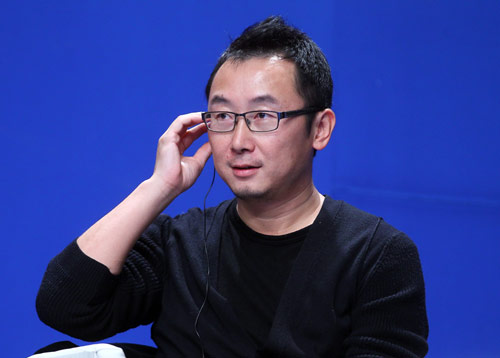 |
| Lu Chuan |
A new show by director Lu Chuan is coming home to roost at the Bird’s Nest. Chen Jie reports.
Zhang Yimou’s show focused world’s gaze on the Bird’s Nest stadium on the 2008 Beijing Olympic Games’ opening night.
Now, another leading Chinese director, Lu Chuan, is creating an “attraction” — tentatively entitled Attraction — at the venue.
Lu and his team are working on a large-scale, open-air show scheduled to open at the Bird’s Nest this fall. Jiang Haoyang, general manager of the production company Bird’s Nest Fengcai Culture, says the company plans to stage 200 shows over three years, starting this autumn.
The post-Olympics use of Beijing’s venues has been a point of hot debate over the past four years. The Bird’s Nest cost about 3.5 billion yuan ($555 million) to construct, and its annual operation and maintenance is estimated to cost more than 170 million yuan.
The stakeholders have lined up an array of events, including big pop concerts, Italian Super Cup soccer matches, car races and the Snow World, with fake snow for kids. Zhang Yimou even returned to direct an arena production of the opera Turandot in October 2009.
But no regular residence has come home to roost in the Bird’s Nest until Attraction. Beijing BeiAo Group and the venue have partnered to found the Bird’s Nest Fengcai Culture to produce and market the show.
Lu captivates most local media.
With just four movies under his belt, the 41-year-old has been acclaimed as one his generation’s best directors.
The son of an accomplished scriptwriter studied English literature before he turned to film and got his master’s degree from the Beijing Film Academy’s Directing Department in 1998.
He rose to fame with his debut production, The Missing Gun (2002), starring Jiang Wen, one of China’s best actors. It enjoyed both handsome box-office returns and raving critical acclaim.
His second flick, Hoh Xil (2004), which depicts the life-and-death struggles between poachers and the volunteer patrol teams who protect Tibetan antelopes, was another success that confirmed his lofty position in China’s film scene.
He spent five years shooting City of Life and Death (Nanking! Nanking), a black-and-white take on the Nanjing massacre of World War II.
His next movie, The Last Supper, will be released this year. Lu has teamed up with theater experts to prepare his first attempt at big open-air shows.
Lu was surprised when he was approached to do the show two years ago, because he “had no experience in this field”, he says.
“But I’d like to explore something new as a young director,” he tells China Daily.
“Different art genres have something in common, whether we’re talking about a movie or a stage show. They said they wanted something new, and that’s what I wanted to do, too. I hope to make a breakthrough, so the audiences can enjoy new experiences.”
But Lu wouldn’t reveal more about the show, except to say it’s a multimedia love story. “It’s a learning process for me,” Lu says.
“The Bird’s Nest has become Beijing’s new symbol and shows China’s power to the world. We’re trying to create a show to display today’s Chinese people’s love, dreams, glory and sense of responsibility. You and me, and him and her, are all in the show. Everybody will find themselves in it,” he continues.
“China has a profound cultural tradition. But we shouldn’t make it a burden to maintain or face value symbols. Cultural tradition is something in the blood.”












